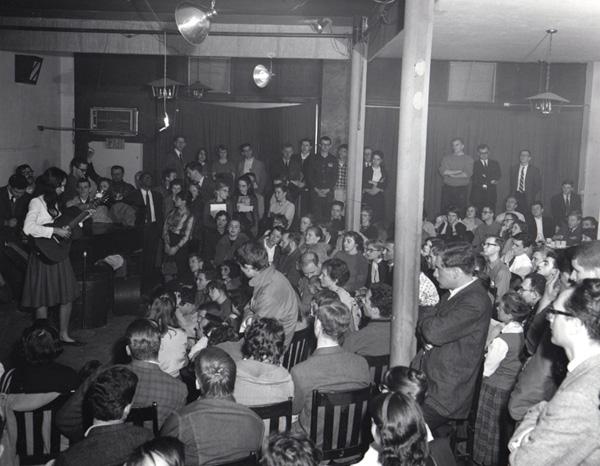WUMB, UMass Boston’s radio station, screened BU graduates Todd Kwait and Rob Stegman’s documentary “For the Love of the Music: The Club 47 Folk Revival” in the Media Theater of the Healey Library. This special screening attracted a crowd of excited fans fueled with eager anticipation to learn about the heyday of Club 47 and the cultural impact it had on the Cambridge community.
While landmarks such as San Francisco and Greenwich Village receive notorious acclaim for creating an American folk utopia during the 1960s, the eclectic roots of traditional folk music is grounded in the streets of Cambridge’s Harvard Square.
During the years of 1958-1968, 47 Mount Auburn Street in Cambridge, MA was the mecca for lovers of folk music who shared an intimate bond of passionately expressing what was real and meaningful in their lives through music.
Narrated by Peter Coyote, the documentary illuminates the branding of the Cambridge folk scene through extensive interviews with artists including Joan Baez, Tom Rush, Taj Mahal, Judy Collins, Maria Muldaur, Geoff Muldaur, Jim Kweskin, Jackie Washington, Jim Rooney, Peter Rowan, and many other musicians who regularly performed at Club 47.
Club 47 was founded in 1958 by two women from Brandeis University who originally imagined the club to be an artsy Paris-inspired coffee house featuring only jazz music. Shortly following the opening of Club 47, the mission of the café quickly changed when 17-year-old BU student and folk singer Joan Baez walked through the doors.
Although Baez received much skepticism from the club owners about performing folk music in a jazz club, she began playing at the club a couple times a week. Within three weeks, Club 47 attracted masses of people who were mystified by Baez’s graceful singing and sultry melodies.
From then on, Club 47 became an arena for extraordinarily talented musicians to gather together and share their genuine love for music, which ultimately hastened a metamorphosis in the American music scene.
In addition to Baez, Club 47 also sparked the careers of legendary folk artists Tom Rush, Judy Collins, and notably Eric Von Schmidt, who became an emblem for digging up and recreating the instrumental sound of traditional folk music. Von Schmidt is also responsible for influencing a young newcomer to the folk scene who eventually became one of the most important figures in American music and culture – Bob Dylan.
The documentary details Dylan’s journey from Minnesota to Cambridge with the original purpose of seeing Carolyn Hester perform at Club 47. However, once he showcased his talent to the club owners and fellow folk artists, Dylan began working closely with Eric Von Schmidt and soon became a valued performer at the club.
More than 50 years following Dylan’s Club 47 days, it is amazing to see how the counterculture’s father of folk and all around music legend once spent his early career, jamming with Cambridge artists who shared the communal bond of solely playing for their shared love of music.
“For The Love of Music” includes rare photos and unreleased music from the Club 47 community and specifically emphasizes audio footage featuring Baez, Von Schmidt, and Dylan performing live at the club. The film also sheds light on the troubling experiences faced throughout Club 47’s decade-long run. The club changed owners on multiple occasions for reasons associated to the rapid inflation of booking fees that increased as artists became more successful.
In addition to business struggles, Club 47 also saw the uprising of the Civil Rights Movement and protests against the war in Vietnam. Even though Cambridge’s folk community could not control what was happening in the nation during that historical time, they found comfort and solace in knowing that Club 47 “always stayed the same when the rest of the world was upside down.”
After 10 riveting years of showcasing gifted folk artists, the life of Club 47 came to an end in 1968. The once not-for-profit club transitioned into a capitalist vacuum, making business expenses too overbearing to handle. Not only was the club too expensive to keep open, but the owners felt as though the club no longer served its original purpose of genuinely playing for the love of music.
The remainder of the film features the ways in which Club 47 influenced future generations of folk, blues, bluegrass, and rock-and-roll. It also sheds light on the importance of appreciating the history of those who honored traditional music and sparked a folk-inspired movement that changed the future of contemporary music.
WUMB typically hosts a variety of folk-inspired events every 5-6 weeks, with each event being featured at a different venue in the Boston area. The next WUMB event will be a concert featuring the musical duo Barnaby Bright at Johnny D’s in Somerville on Tuesday, March 19 at 7:30 p.m. For more information on upcoming events, visit WUMB’s website at http://www.wumb.org/.





















































